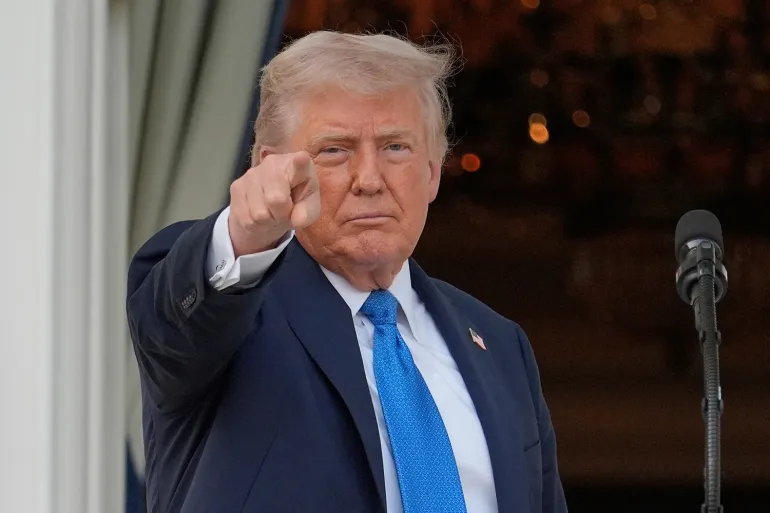
WafricNews - June 5, 2025
U.S. President Donald Trump has announced a sweeping new travel ban targeting nationals from 19 countries, reigniting a controversial policy that defined his first term. Of the nations impacted, 12 face full entry restrictions, while seven are subject to partial bans. Several African countries are among those hit hardest.
The proclamation, signed Wednesday, revives a cornerstone of Trump’s immigration agenda, with the administration citing high rates of visa overstays and perceived national security threats as justification. Trump has suggested the list may expand, stating in a video that new nations could be added as “threats emerge around the world.”

Seven African Countries Fully Banned, Three Partially Restricted
African nations feature prominently in the new restrictions. Citizens of Chad, Sudan, Libya, Eritrea, the Republic of Congo, Somalia, and Equatorial Guinea are now subject to a full travel ban. Partial restrictions have also been placed on nationals from Burundi, Togo, and Sierra Leone.
Though visa issuance to these countries has historically been low, the ban is expected to severely impact people-to-people exchange, business, and academic opportunities for thousands. For instance, Somalia has been labelled a “terrorist safe haven” by the White House, while Chad was singled out for having one of the highest visa overstay rates—nearly half of all entrants in the past year.
In Sudan, the deteriorating security situation and the military-led government’s alleged use of chemical weapons during its internal conflict have worsened relations with Washington. Similarly, Eritrea, still recovering from its role in the Tigray conflict in Ethiopia, has faced accusations of war crimes, contributing to its inclusion.
The African Union Pushes Back
In response to the sweeping bans, the African Union Commission issued a statement expressing “deep concern” over the policy’s long-term impact on Africa–U.S. relations.
“While recognising the sovereign right of all nations to protect their borders and ensure the security of their citizens, the African Union Commission respectfully appeals to the United States to exercise this right in a manner that is balanced, evidence-based, and reflective of the long-standing partnership between the United States and Africa,” the statement read.
The AU also warned of the potential damage to educational exchange, business cooperation, and diplomatic goodwill built over decades.
Broader Global Reach: From Venezuela to Myanmar
Outside Africa, the ban affects several other nations with strained ties to Washington. These include Afghanistan, Iran, Yemen, Myanmar, and Haiti—countries that have experienced conflict, political instability, or tense diplomatic relations with the U.S.
The decision follows the recent Supreme Court ruling that allowed Trump’s administration to suspend a Biden-era humanitarian parole program, which previously permitted temporary residence for hundreds of thousands of people from Cuba, Venezuela, and Nicaragua. Venezuela, with over 55,000 nonimmigrant visas issued last year alone, is expected to see a significant impact.
In Southeast Asia, Myanmar and Laos were included due to their refusal to cooperate on the return of deported nationals. Myanmar’s military junta continues to wage a brutal civil war, while Laos, though currently enjoying stable ties with the U.S., has a complex historical relationship dating back to the Vietnam War era.
Egypt Spared, Despite Incident Prompting Policy Shift
Notably absent from the ban is Egypt, even though the latest restrictions were announced days after an Egyptian national was charged with attempted murder following a Molotov cocktail attack in Boulder, Colorado. U.S. officials confirmed that the attacker had overstayed a temporary visa.
Egypt remains a vital U.S. ally in counterterrorism and regional stability. Since 1978, the country has received over $50 billion in U.S. military aid and continues to maintain strategic relations with Washington.
Impact Varies by Country
According to the State Department, over 126,000 visas were issued in the past year to nationals of the 19 affected countries. The bulk were granted to Afghans under the Special Immigrant Visa program for individuals who assisted U.S. military and diplomatic missions.
While existing visa holders and permanent residents are exempt from the new restrictions, analysts warn that the move may have ripple effects—disrupting families, businesses, and academic networks globally
By WafricNews Desk.


Comment
To post a comment, you have to login first
LoginNo Comments Yet...